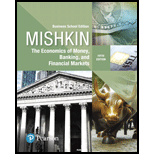
You wish to hire Ron to manage your Dallas operations. The profits from the operations depend partially on how hard Ron works, as follows.
| Profit Probabilities | ||
| Profit = $10,000 | Profit = $50,000 | |
| Lazy | 60% | 40% |
| Hard worker | 20% | 80% |
If Ron is lazy, he will surf the Internet all day, and he views this as a zero-cost opportunity. However, Ron views working hard as a “personal cost” valued at $1,000. What fixed percentage of the profits should you offer Ron? Assume Ron cares only about his expected payment less any “personal cost”.
Concept Introduction:
The principal−agent problem is the differences of interest and moral hazard matters that occurs when one person (the "agent") is able to make decisions and/or take actions on behalf of, or that impact, another person (the "principal").
Want to see the full answer?
Check out a sample textbook solution
Chapter 8 Solutions
Pearson eText Economics of Money, Banking and Financial Markets, The, Business School Edition -- Instant Access (Pearson+)
- O'Reilly's financial analysis trends for 2022, 2023, and 2024arrow_forwardFind the equation of the price offer curve and demand curve for the following utility function: U= min (3x, 2y). Let income of the consumer be M, price of good X is Px and price of good Y be Py. Also draw both the curves. (b) Let utility function of a consumer be given by U(x,y) = xy + x, where X and Y are the two goods (i) Is marginal rate of substitution diminishing? (ii) Are marginal utilities of both goods X and Y diminishingarrow_forwardx, y) = 2√x + y. Let price of X be $0.50, price of Y be $1 and income is $10. (i) Find initial equilibrium of the consumer. (ii) Find the new equilibrium if price of X falls to $0.20. (iii) Using Hicksian technique decompose the price effect into substitution and income effectsarrow_forward
- Price elasticity by the hour of day. Average parking occupancy rates of 2011 (i.e., after the rate change) in neighborhoods with a decrease, no change and an increase in rates are also displayed in this figure. 0.0 -0.1 E I -0.2 a S -0.3 t i -0.4 C i -0.5 t Y -0.6 -0.7 -0.8 Hour of the day 60 8 9 10 11 12 13 14 15 16 17 -0.9 -Decrease price elasticities model 1 → Decrease neighborhoods' occupancy in 2011 ...... No price change neighborhoods' occupancy in 2011 Increase price elasticities model 1 ⚫ Increase neighborhoods' occupancy in 2011 50 8333PONG> 40 40 30 20 20 a n C Y 30 10 0 (0°) ૪ Based on the figure showing estimated elasticities after the price increase, what times of day have the most elastic parking demand? Why do you think this is the case? Explain.arrow_forwardFinancial analysis 2022, 2023, and 2024 for O' Reilly's trends in dataarrow_forward9-5. In a replacement analysis for a vacuum seal on a spacecraft, the following data are known about the challenger: the initial investment is $12,000; there is no annual maintenance cost for the first three years, however, it will be $2,000 in each of years four and five, and then $4,500 in the sixth year and increasing by $2,500 each year thereafter. The salvage value is $0 at all times, and MARR is 10% per year. What is the economic life of this challenger? (9.5)arrow_forward
- 9-4. A vehicle costs $30,000 and incurs maintenance costs. increasing by $500 annually, starting at $1,000 in year one. When is it economical to replace it, assuming no salvage value? Use a MARR = 8% per year.arrow_forward9-14. Analyze the replacement of an old crane with $7,000 annual maintenance and a $30,000 current market value with a new one for $100,000 and $2,000 annual maintenance. The MARR is 15% per year.arrow_forward9-15. A small high-speed commercial centrifuge has the following net cash flows and abandonment values over its useful life (Table P9-15, p. 454). The firm's MARR is 12% per year. Determine the optimal time for the centrifuge to be abandoned if its current MV is $9,500 and it won't be used for more than five years. (9.8)arrow_forward
- Balance sheet, income statement and statement of cash flow 2022, 2023, and 2024 for AutoZone and trend analysisarrow_forward9-1. An existing machine with a book value of $10,000 has maintenance costs of $2,000 per year. A new machine costs $25,000 with annual maintenance costs of $500. When should the existing machine be replaced? The company's MARR is 15% per year.arrow_forward9-3. Analyze replacing a commercial oven with $800 annual maintenance and a $3,000 salvage value with a new one for $15,000 and $300 annual maintenance. The company's MARR is 12% per year.arrow_forward

 Principles of Economics (12th Edition)EconomicsISBN:9780134078779Author:Karl E. Case, Ray C. Fair, Sharon E. OsterPublisher:PEARSON
Principles of Economics (12th Edition)EconomicsISBN:9780134078779Author:Karl E. Case, Ray C. Fair, Sharon E. OsterPublisher:PEARSON Engineering Economy (17th Edition)EconomicsISBN:9780134870069Author:William G. Sullivan, Elin M. Wicks, C. Patrick KoellingPublisher:PEARSON
Engineering Economy (17th Edition)EconomicsISBN:9780134870069Author:William G. Sullivan, Elin M. Wicks, C. Patrick KoellingPublisher:PEARSON Principles of Economics (MindTap Course List)EconomicsISBN:9781305585126Author:N. Gregory MankiwPublisher:Cengage Learning
Principles of Economics (MindTap Course List)EconomicsISBN:9781305585126Author:N. Gregory MankiwPublisher:Cengage Learning Managerial Economics: A Problem Solving ApproachEconomicsISBN:9781337106665Author:Luke M. Froeb, Brian T. McCann, Michael R. Ward, Mike ShorPublisher:Cengage Learning
Managerial Economics: A Problem Solving ApproachEconomicsISBN:9781337106665Author:Luke M. Froeb, Brian T. McCann, Michael R. Ward, Mike ShorPublisher:Cengage Learning Managerial Economics & Business Strategy (Mcgraw-...EconomicsISBN:9781259290619Author:Michael Baye, Jeff PrincePublisher:McGraw-Hill Education
Managerial Economics & Business Strategy (Mcgraw-...EconomicsISBN:9781259290619Author:Michael Baye, Jeff PrincePublisher:McGraw-Hill Education





